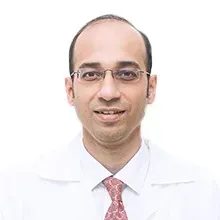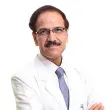Overview of Arrhythmia Surgery Treatment India
Arrhythmia Surgery is performed to treat the condition of the heart known as arrhythmia, also known as dysrhythmia. Arrhythmia is a problem with an abnormal or irregular heartbeat. In this condition, the heart can either beat too fast or too slow with an irregular rhythm. In some cases, arrhythmias are harmless but some can be severe. When the heart rate is irregular, the heart may not be able to pump enough blood and lack of blood flow can damage the heart, brain, and other organs. It is a dangerous condition that requires medical treatment, surgery, or medical devices.
Types of Arrhythmia Surgery Treatment India
Types of Arrhythmias
There are five types of arrhythmias, categorized by the heart rate and its origin, including:
01. Tachycardia - In this condition, the heartbeat is too fast, more than 100 beats per minute.
02. Bradycardia - The heartbeat is too slow i.e., 60 beats per minute.
03. Premature Heartbeat - It is a common and harmless type of arrhythmia. Additionally, it does not cause symptoms.
04. Supraventricular Arrhythmia - It is a type of tachycardia that occurs in the atrioventricular node or atria.
05. Ventricular Arrhythmia - It is a type of tachycardia that begins in the hearts lower chambers. It can be life-threatening, thus requiring immediate treatment.
Treatments of Arrhythmia
Arrhythmia treatment depends on the severity and type of arrhythmia. In some cases, treatment may or may not be required. The treatment is required only if the arrhythmia is causing other health problems. Treatment may include lifestyle changes, medications, electrical devices, or arrhythmia surgery. Surgery is the last option to treat arrhythmias when other non-surgical treatments fail to control it. The available treatment options are:
01. Medications - The medicines can control or restore a normal heartbeat. It is important to take prescribed medications only.
02. Vagal Maneuvers - It is effective to control arrhythmia that occurs in the lower half of the heart. These maneuvers include dunking face in ice water, holding breath, or coughing.
03. Cardioversion - It is used to treat atrial fibrillation. In this procedure, the doctor will deliver a shock to the heart through patches on the chest. It affects the electrical impulse in the heart and helps to restore a normal rhythm.
04. Catheter Ablation - In this procedure, doctors insert catheters through blood vessels to the heart. There are electrodes at the end of catheter tips with the capability to use cold, heat, or radiofrequency energy to damage the blockage that is causing arrhythmia. It takes three to six hours to complete.
05. Pacemaker - A pacemaker is a small device that is implanted near the collarbone. It helps to control abnormal heart rhythms. If the device detects abnormal heart rate, it sends electrical pulses to stimulate the heartbeat to normal.
06. ICD Device (Implantable Cardioverter Defibrillator) - It is recommended if patients have a high risk of fast or irregular heart rate in the lower part of the heart. Moreover, if a patient has sudden cardiac arrest that increases the risk of heart attack, it can be recommended. An ICD is a device powered by a battery and is implanted under the skin near the collarbone. An electrode-tipped wire from ICD will be thread through veins to the heart. It continuously monitors heart rhythm and in case of abnormal heart rate, it sends out energy shocks to normalize the rhythm. The frequency of energy shock, whether it will be low- or high, depends on heart rate.
07. Maze Procedure - In this procedure, a surgeon will make several surgical incisions in the heart tissue of the upper half heart. These incisions are made in a maze pattern. The scar tissue does not cause electricity and interferes with electrical impulses that cause arrhythmia. It is an effective procedure and is reserved for patients whose condition did not improve with other treatments.
08. Coronary Bypass Surgery - This surgery is done only if patients have severe coronary artery disease along with arrhythmias. This procedure helps to improve the blood flow to the heart.
Diagnosis of Arrhythmia Surgery Treatment India
Arrhythmias Diagnosis
To diagnose an arrhythmia, the doctor will do a physical examination first which includes reviewing symptoms and medical history. The doctor may perform heart-monitoring tests that may include:
01. Electrocardiogram (ECG) - ECG uses sensors that are attached to the chest. These sensors detect the electrical activity of the heart.
02. Holter Monitor - It is a portable ECG device that is to be worn for a day or more. It records the heart's activity as you perform your daily activities.
03. Event Recorder - It is a portable ECG device that is attached to the body only when you have symptoms. The doctor will check the heartbeat and rhythm at the time of symptoms.
04. Echocardiogram - In this test, a hand-held device is placed on the chest. It produces images of the heart's structure, size, and motion.
05. Implantable Loop Recorder - It is performed when symptoms are very infrequent. A recorder is implanted under the skin that records heartbeat and detects abnormal heart rhythms.
06. Stress Test - In this test, you have to do exercise on a treadmill or stationary bicycle and heart activity will be monitored simultaneously.
07. Tilt Table Test - It is performed if a patient has fainting spells. A heartbeat and blood pressure are monitored as one lies flat on a table. In the second stage, the table will be tilted and the medical team will observe the response of the heart and nervous system to the change in angle.
08. Electrophysiological Testing and Mapping - Doctors insert thin, flexible tubes with electrodes in blood vessels in different spots of your heart.
Symptoms of an Arrhythmia
Arrhythmia may not cause any symptoms and can be silent. If signs occur, it may include:
01. Fatigue
02. Dizziness
03. Fainting
04. Rapid heartbeat
05. Chest discomfort
06. Shortness of breath
07. Palpitations
08. Sudden cardiac arrest
Symptoms and Risk factors
Causes of Arrhythmias
There are several conditions or habits that can lead to or cause arrhythmia, including:
01. Smoking
02. Excess intake of alcohol or caffeine
03. Anxiety
04. Family medical history
05. Sleep apnea
06. Diabetes
07. Hyperthyroidism or hypothyroidism
08. High blood pressure
09. Blocked arteries
10. Infection due to COVID-19
11. Heart tissue scarred due to heart attack
12. Current heart attack
13. Changes in the heart's structure
Recovery from Arrhythmia surgery
If a device, pacemaker or ICD, is implanted, the medical team will make sure these devices are working correctly. Due to medical advancements, most electronic devices do not cause any problem and patients can resume normal activities within several weeks. Batteries of these devices need to be replaced occasionally.
In case, the surgery was an exit solution then patients should expect a longer recovery period. The patient needs to stay in the hospital for 5 to 7 days. The full recovery time is 2 to 3 months.
Top Doctors for Arrhythmia Surgery in India
Empower your Health with the Expertise of Leading Medical Professionals.
Dr. Anunai Srivastava
Department of Interventional Cardiology
Consultant Interventional Cardiology
Book Appointment
Dr. Satbir Singh
Department of Cardiology
Associate Director Cardiology
Book Appointment
Treatment Costs for Arrhythmia Surgery
Be the change and be an opportunist in transforming healthcare.
How it's Works
Guiding your Journey from Discovery to Treatment Planning and Beyond.
Discovery
Get a consultation to discover about your treatment
Pre-Treatment
Admission to the best hospital and all pre-treatment facilities
Post Treatment
Get post-treatment follow-up care with medicine fulfillment
Treatment Planning
Hassle-free treatment planning with package & cost estimations
in-treatment
world-class quality procedures and equipment for treatment
















-viney-jetley.webp)




